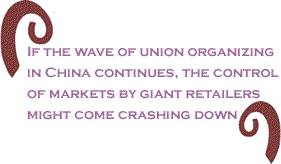The
times are changing - in China.
There
have been worker actions and strikes in the recent past
in the Peoples Republic of China, but the current strike
against a Honda Lock factory in Zhongshan is likely a portent
of things to come for transnational corporations, for the
ruling Chinese old guard, and for people around the world
who have come to expect rock bottom prices for all manner
of consumer goods.

A
Chinese lawyer, interviewed on television about the strike,
probably summed up the situation most concisely. These young
workers, he said, are �not like their parents (generation).�
He and a young worker, who also was interviewed, declared
of younger workers, that they don�t mind working hard, they
don�t mind working long hours, but they want to be paid
so they can have a life, other than working.
Their
parents� generation was willing to take their leadership
in virtually all aspects of life from the central committee
of the communist party. They still were willing to forbear,
even suffer, if that was what was required of them.
In
the strange mix of economies in China,
there is still deprivation among many, especially the rural
people and those who have been forced to the cities to find
work and who - with the global economic recession - now
are unemployed and homeless, unless they go back to where
they came from.
In
contrast, there are plenty of millionaires and showy cities,
where the accumulation of money is becoming an accepted
fact and an honorable goal of life.
When
workers, who are being paid about 67 cents an hour and might
bring home $27 a week, look at the millionaires and those
who might soon be millionaires, it becomes crystal clear
what their prospects are for a decent life - slim.
 Even
in China, $27 a week is not much money. Charlie Kernaghan,
executive director of the National Labor Committee, pointed
out this week that the striking workers at Honda Lock are
asking for at least a 50 percent increase, $1.34 an hour
and $54 a week. Even
in China, $27 a week is not much money. Charlie Kernaghan,
executive director of the National Labor Committee, pointed
out this week that the striking workers at Honda Lock are
asking for at least a 50 percent increase, $1.34 an hour
and $54 a week.
�Cracks
are appearing in China�s factory model
� which, over the past two decades has consisted of grueling
hours, seven-day workweeks, below-subsistence wages, prison-like
discipline, primitive living conditions and zero rights,�
said Kernaghan. �The All China Federation of Trade Unions
is now openly being discussed as a shill for the government.
A very knowledgeable activist in China told the National Labor Committee that the
strike at Honda is �...an event of historic proportions��
The
strike is not just over money. The approximately 500 workers
who picketed outside the Honda factory in early June also
reject the state-provided union and want to elect their
own union leaders - in other words, to have free unions.
The
Chinese activist told Kernaghan, �It reflects the fact that
the struggle of China�s working class (made
up of mostly migrant laborers) has developed to the stage
where workers are demanding organization. We are closely
monitoring the development and aftermath of this situation.
The Honda strike has huge significance for China�s workers. Many Chinese
workers are closely following this strike.�
The
1,700 workers who are striking Zhongshan�s Honda factory
ship parts to Honda factories in North America, through
a warehousing system in Bremen, Georgia.
That�s the American connection. Honda, like other manufacturers
which have shifted their production to China
over the past 20 years or more have depended on a country
of pliant workers - they would do what they were told and
take whatever slave wages were offered.
 Kernaghan
pointed out over the years that, the lower the overseas
wages, the lower would be the Americans� wages. In the U.S., the United Auto Workers (UAW) has seen its
membership melt away over the past two decades, as the American
auto industry could not compete with the low wages paid
in countries like Korea, then China. Kernaghan
pointed out over the years that, the lower the overseas
wages, the lower would be the Americans� wages. In the U.S., the United Auto Workers (UAW) has seen its
membership melt away over the past two decades, as the American
auto industry could not compete with the low wages paid
in countries like Korea, then China.
But
the UAW could not even compete with the foreign car companies
that were making cars in the U.S., itself. Those
factories generally were built in southern states, where
the hostility to unions was highest and the union-busting
wave that swept the country since the early 1980s opened
the door to multi-million-dollar �union avoidance� campaigns
waged by the foreign companies. They feared no punishment
for thwarting their workers� lawful unionization efforts,
because everyone was doing it, starting with the biggest
U.S. corporations.
The
virtual disappearance of strikes in the U.S.
over the past two decades indicates that some global corporations
have found a rather pliant workforce right here in America. They just have to be careful to put their
factories in the right part of the country to get the results
they want.
In
China, though, the Honda action was just one of five at
foreign plants in China, according to the British newspaper,
The Guardian, indicating that the workers are on
the move there and the successes they have achieved (one
company agreed to pay increases of about 23 percent) encourages
others to take action to improve their lives.
The
situation in the U.S. would seem to indicate that an older
union movement that is growing smaller, year by year, is
made up of workers who do not expect the realization of
their rights and freedom in setting the terms of their employment
(as through a union contract), but see freedom in the ability
to move from job to job throughout their working lives.
 With
the latter circumstance, it is difficult for workers to
provide for their retirement years, but they seem to be
willing to give that up for the freedom to move from one
computer-oriented or �information technology� job to another. With
the latter circumstance, it is difficult for workers to
provide for their retirement years, but they seem to be
willing to give that up for the freedom to move from one
computer-oriented or �information technology� job to another.
Young
Chinese workers have looked at their circumstance - low
pay, long hours, onerous working conditions, lack of a life
outside work - and they have decided that they want something
better.
They
read the papers and they know where the money from their
work goes: to giant retail transnational corporations in
Japan,
the European Union, and the U.S.
They would like some of that, since their country seems
to be the manufacturing and industrial center (along with
India) of the global economy.
The
Wal-Marts of the world have based their entire existence
in cornering the market in retailing, eliminating the competition,
and dictating the price that they pay their supplier contractors
in low-wage countries. If the wave of union organizing in
China and other places continues, as it seems to be doing,
the control of markets by giant retailers might come crashing
down, perhaps to be replaced with smaller, local enterprises.
One
thing that is clear is that, if union organizing continues
in China among young workers, the days of very cheap
consumer goods - the stuff that we�re told keeps the American
economy running - are numbered. The goods may still be relatively
cheap, but the increases in pay and the improved lives of
Chinese workers, through their own efforts, will have to
be paid for from some pool of money. Right now, the only
place that the improved wages and benefits can come from
is increased prices at the discount stores or from the profits
of the handful of owners of the giant operations.

A
good guess would be the retail prices rising and, right
up there with the other important aspects of modern labor
relations in Corporate America, taking it from the people
who work in retail. The most visible mouthpiece of Corporate
America, the U.S. Chamber of Commerce, will be weighing
in on the side of Chinese corporations and the government.
If
there is an equivalent of Chinese working conditions in
America, it�s the condition of retail workers, yet they
seem to be able to accept those conditions, because those
may be the only jobs that are easy to get, if you ignore
the drug testing and psychological screening to get them
(don�t want to get any workers who lean toward unions to
improve their lives).
There
will be adjustments made in the prices paid for consumer
goods in the U.S.
as a result of unionization of workers in China. But workers in America should take
a good look at what is happening there. There are lessons
to be learned about improving not only their own personal
lives and those of their co-workers, but improvements in
the lives of their communities and the nation.
 BlackCommentator.com
Columnist, John Funiciello, is a labor organizer and former
union organizer. His union work started when he became a
local president of The Newspaper Guild in the early 1970s.
He was a reporter for 14 years for newspapers in New
York State. In addition to labor
work, he is organizing family farmers as they struggle to
stay on the land under enormous pressure from factory food
producers and land developers. Click here
to contact Mr. Funiciello. BlackCommentator.com
Columnist, John Funiciello, is a labor organizer and former
union organizer. His union work started when he became a
local president of The Newspaper Guild in the early 1970s.
He was a reporter for 14 years for newspapers in New
York State. In addition to labor
work, he is organizing family farmers as they struggle to
stay on the land under enormous pressure from factory food
producers and land developers. Click here
to contact Mr. Funiciello.
|

